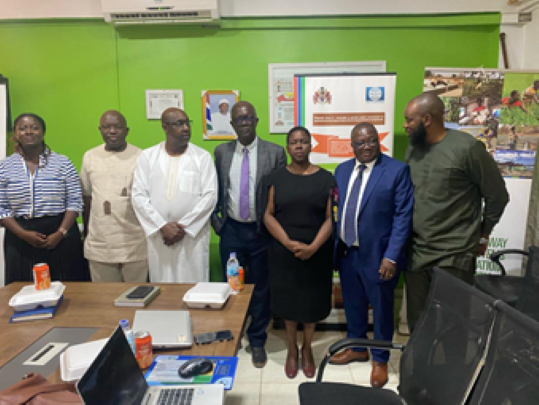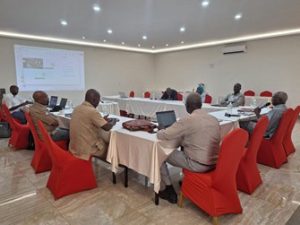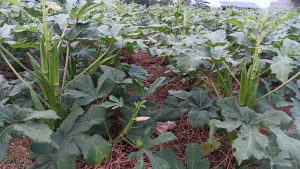GAMBIA: TAAT highlights innovative delivery mechanisms for climate-resilient rice varieties

Technologies for African Agricultural Transformation (TAAT) Programme has highlighted the need to adopt win-win but innovative delivery mechanisms to facilitate the large-scale adoption of climate-resilient rice varieties in the Gambia.
This was made known during a recent Project Appraisal Mission for the Regional West Africa Rice Development (REWARD) Project in the Gambia led by the African Development Bank.
The project appraisal mission for the REWARD Project in Gambia, which was held from 15th February to 1st March 2024, comprised visits to ministries and agencies of government, eight beneficiary farming communities, including Marou Farms and Mira Farms, private sector organisations involved in rice value chain production, processing and marketing of rice seeds and rice grains.
The communities visited during the mission were Choya community, Patcharr, Tabanani, Kesser Kunda, Jahally & Pacharr in the Central River South Region; Limbambulu Bambo in the Upper River Region; Barajally in the Central River North Region and Kandonku and Kafafi firm in the Western River Region.
The team assessed the constraints in rice production in The Gambia and proposed actionable solutions to improve access to path-breaking technologies, including innovative ways to disseminate climate-resilient rice technologies effectively.
The team equally proffered approaches for producing the needed breeder, foundation and certified seeds, mechanisms for distributing agri-inputs and strengthening the Gambian Seed Trade Association. Also, four terms of reference (ToRs) were developed for the capacity development of twelve technical staff, comprising six extension agents, two quality control and certification agents, two rice breeders and two technical assistants.
A meeting to finalise the components, sub-components, activities, and the costs of the project, the procurement, financial management, and implementation modalities, as well as environmental aspects, gender, and social issues of the programme, was held with the Hon. Minister of Agriculture, Dr Demba Sabally, his Permanent Secretary (PS), Mr. Mod Secka the Permanent Secretary of the Ministry of Finance, Mr Abdoulie Jallow and the Governor of the Bank of The Gambia, Mr. Buwa Saidy.
Taking into cognizance the components of the project, namely increased rice productivity and production, regional policy, markets and trade, post-harvest and mechanization, and project management, the meeting evaluated the proposed project in accordance with the African Development Bank Group’s lending and grant policies and assessed the technical-economic, social, and environmental feasibility of the actions planned by the project, considering the priorities expressed by regional organizations and countries.
During the mission, key issues bordering on the beneficiary country and content of the proposed project, including its components and sequencing of activities, costs, supply and disbursement plans, institutional arrangements, interim grant conditions, and other relevant issues, were addressed.
Mr. Abdoulie Touray, the Project Coordinator, in his closing remarks at the end of the mission, expressed appreciation to the appraisal team members for the insights, solutions, and recommendations shared during the visit and assured them of dutiful implementation in line with the project’s goals.
It would be recalled that the African Development Bank, together with the AfricaRice Centre, recently launched the US$650 million REWARD programme in 16 West African countries. Under the programme, a million farmers will cultivate up to 750,000 hectares of land to produce 53 million metric tons of rice in five years.
Following the AfDB-led Dakar 2 Feed Africa Summit in 2023, the Food and Agriculture Compacts developed by the respective countries indicated high inclusion of rice across West Africa. This reflects the high consumption and importation rates of rice in the region, which has led to higher increases in the production-consumption gap.
The REWARD project seeks to improve the production and competitiveness of rice for marketing across West Africa in order to achieve Rice self-sufficiency in the region.
Recent Stories
Related Stories
- Tanzania: TAAT and partners Showcase Scalable Solutions for Africa’s Grain Challenges
- KENYA: TAAT and Partners convene stakeholders for a seed roadmap
- COTE D’IVOIRE: TAAT and Partners convene stakeholders for a seed roadmap
- GHANA: TAAT Engages Stakeholders on Innovation Platform Model
- TAAT facilitates seed roadmap to boost agricultural productivity in Benin





